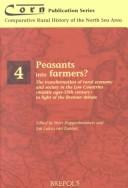| Listing 1 - 1 of 1 |
Sort by
|

ISBN: 250351006X 9782503510064 9782503537313 Year: 2001 Volume: 4 Publisher: Turnhout Brepols
Abstract | Keywords | Export | Availability | Bookmark
 Loading...
Loading...Choose an application
- Reference Manager
- EndNote
- RefWorks (Direct export to RefWorks)
Since his pioneering article of 1976 the American historian Robert P. Brenner has tried to come to terms with an issue that has puzzled historians for generations: how can we explain the differences in growth-patterns of North Western European countries in the transition from feudalism to capitalism. In a frontal attack on both the ‘(homeostatic) demographic’ and ‘commercialization’ models, Brenner traced the roots of the divergent evolutions back to rural and feudal ‘social-property relations’. In the debate that immediately followed Brenner’s first article, and in subsequent exchanges, the Low Countries were sorely neglected, although areas such as Flanders and Holland played a decisive role in the economic development of Europe. This was partly due to a lack of publications on Dutch rural history in foreign languages. This volume aims to fill this lacuna. It draws upon substantial research, and confronts the Brenner thesis with new results and hypotheses; and it contains a powerful and detailed response by Brenner himself.
Agriculture --- Rural development --- Economic aspects --- History of the Low Countries --- anno 1200-1799 --- anno 1800-1899 --- Netherlands --- Economic conditions. --- Belgique --- België --- Histoire de l'agriculture --- Landbouwgeschiedenis --- Nederland --- Pays-Bas --- 63 <09> --- 338 <09> --- 301.3509493 --- 338 <09> Economische geschiedenis --- Economische geschiedenis --- 63 <09> History of agriculture --- History of agriculture --- Social sciences Sociology Rural Communities Belgium --- Community development, Rural --- Development, Rural --- Integrated rural development --- Regional development --- Rehabilitation, Rural --- Rural community development --- Rural economic development --- Agriculture and state --- Community development --- Economic development --- Regional planning --- Citizen participation --- Social aspects --- Agriculture - Economic aspects - Netherlands --- Rural development - Netherlands
| Listing 1 - 1 of 1 |
Sort by
|

 Search
Search Feedback
Feedback About UniCat
About UniCat  Help
Help News
News